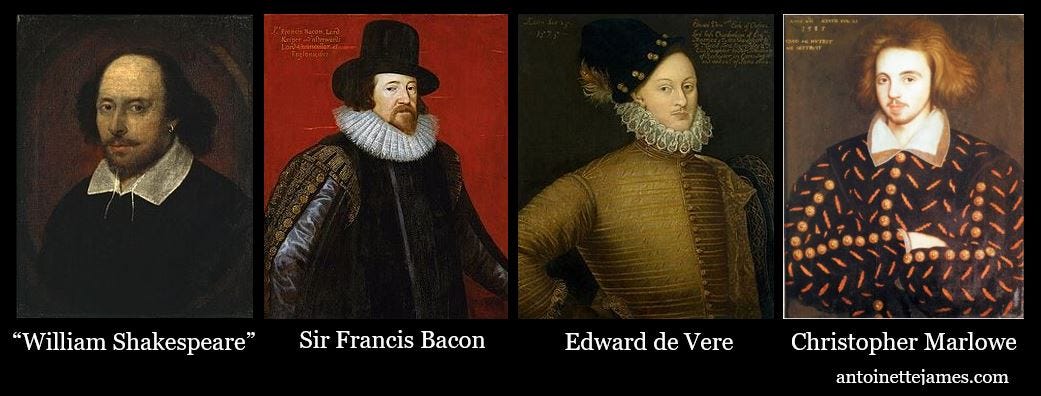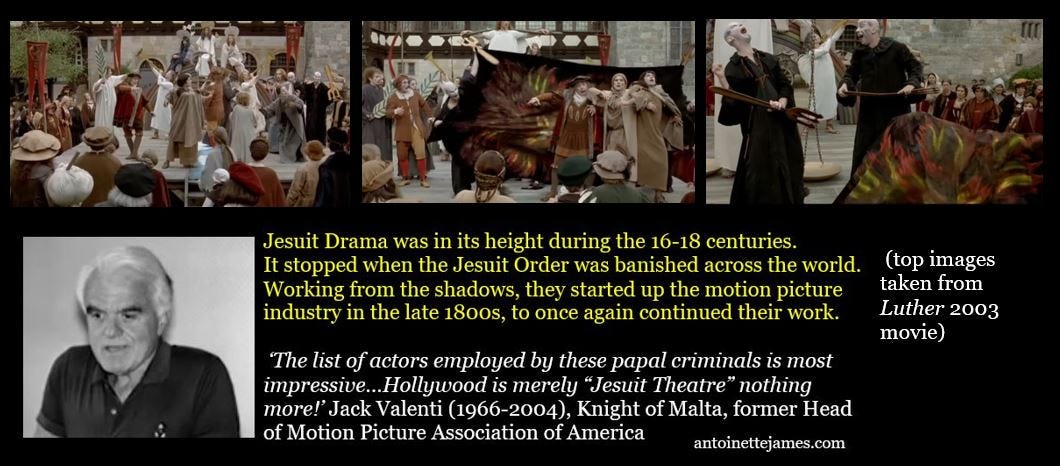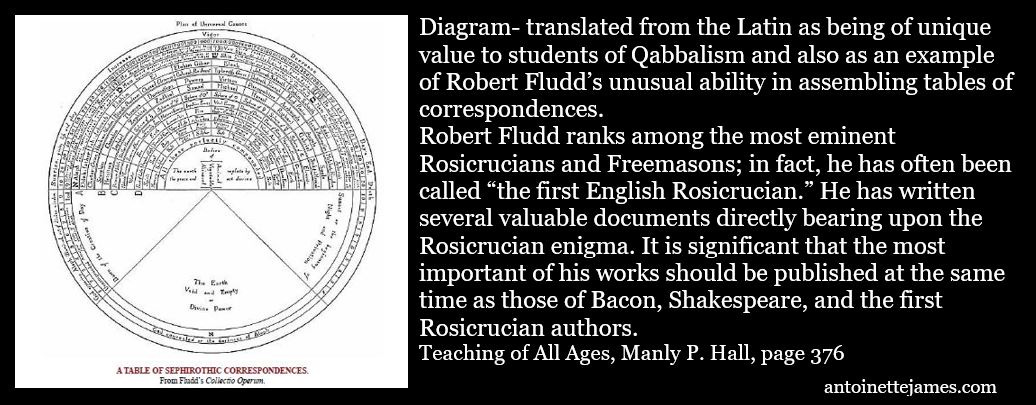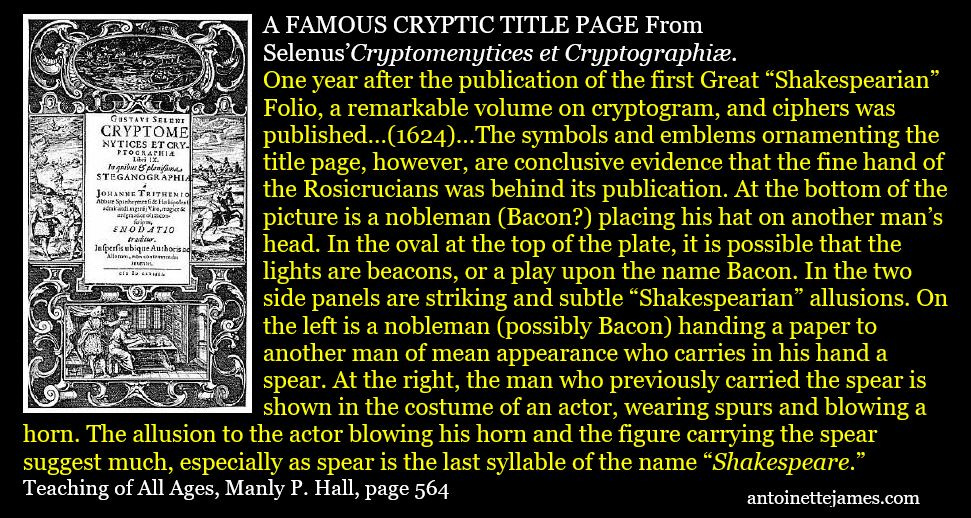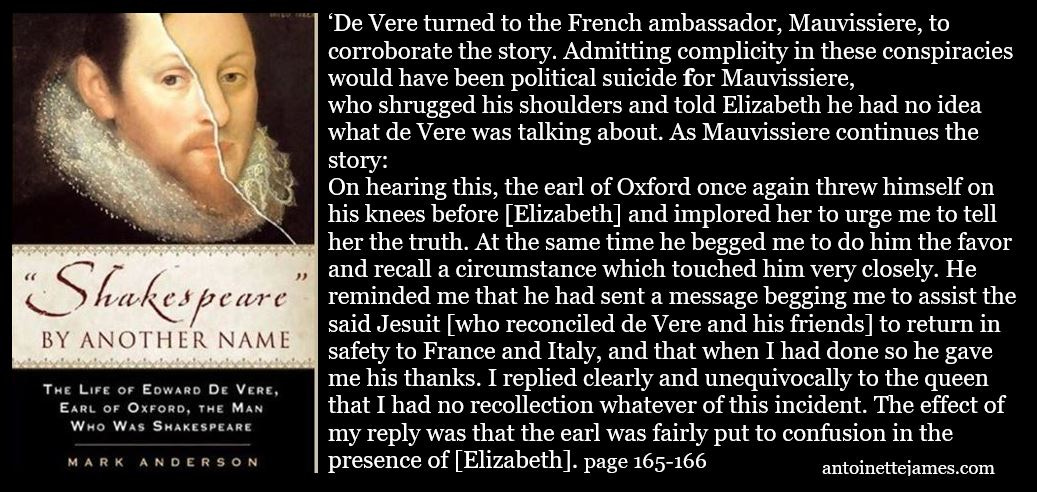452 years ago, on the 23rd of April 1564, William Shakespeare was born and on 23rd April 1616 he died – so the history books say. But there is so much mystery around every aspect of Shakespeare’s life and secrecy around his works, to make it impossible to verify specifics of who this playwright truly was or wasn’t!
The thirty-eight surviving plays, 154 known sonnets and a selection of long and short poems historically classified as Shakespearean is an unchallengeable holy grail. So important are they to the elite social engineers, that the works have been translated into every major living language and are performed more often than those of any other playwright.
What to make of Shakespeare as a person, how to interpret his religo-political plays, and finding the key to unlocking suspected Rosicrucian/esoteric papal codes has prompted endless researched books. The results conclude - a phantom playwright.
‘Had his plays and poems been frankly offered as anonymous, no doubt the scholars of subsequent times would have been quick to respond to the challenge and would long since have cleared up the mystery of their origin. The works were, however, published under the name “William Shakespeare,’ which resembled the name of an obscure young grain-dealer of Stratford, one William Shaksper (or Shagsper, or Shakspe, or Shaxper, as it was variously written). According to the few meagre records of him which exist, this Shaksper spent some years in London during the period when the dramas were appearing in the public theatres. As a result of this coincidence, generations of school-children have been instructed to believe that the incomparably talented and sensitive genius who wrought the plays out of the tumult of joys, anguish and intellectual zest to which they bear unmistakable witness, out of a broad learning and experience, out of an intimate familiarity with the whole range of court-life to say nothing of a jealous and passionate pride of heritage, who contributed more than any other hundred writers to the creation of the language we speak, was a kind of amiable nonentity, nearly unknown to his contemporaries, almost illiterate.’ This Star of England: Shakespeare, 1952, Dorothy and Charlton Ogburn, page X-Xi
There have been many extraordinary playwrights in history, yet only those who support the Gnostic narrative receive accolades, exposure in schools and universities, media and Hollywood. No one, no one, gets to the top without being puffed up by the ruling class. And where better to recruit a useful Change Agent in the 17th century than in dominantly Catholic Stratford-upon-Avon.
‘At times Shakespeare employs a terminology so precise as to indicate an intimate knowledge of Catholicism... Julia’s line: “I see you have a month’s mind to them,”…The Two Gentlemen of Verona has been misunderstood by Shakespearean lexicographers…who failed to recognize a “month’s mind” as being “the name first used for the month of remembrance during which daily [Roman catholic] Masses were offered for the souls of the dead, and now applied to the Mass said for them a month after death. . . .” Juliet’s mention of “evening mass” has been thought to reveal an ignorance of Catholic liturgy,* whereas it turns out to be an indication of…Shakespeare seems to show an appreciative attitude towards vestments, vessels, and other properties of Catholicism.’ The Shakespeares and the Old faith, 1946, John Henry De Groot, page 171, 172
The Jesuit Order, officially cunningly and benignly titled the Society of Jesus (code for Gnostic Horus), was founded exactly thirty years before Shakespeare’s birth in 1534. The first Superior General (Black Pope) was Ignatius of Loyola established the Order after the Protestant Reformation with the specific goal to destroy freedom of religion and conscience by whatever means necessary. In September 1540 Pope Paul III commissioned the Order to wage war on the earth’s people commencing the counter-reformation.
‘That Shakespeare should have stated the doctrine of Catholicism so acutely and that he should have taken the trouble to show how Pandulph’s advice to repudiate an oath was ethical is illuminating. The scene is in sharp contrast to that in The Troublesome Raigne, in which no effort is made to rationalize the repudiation, but in which the Cardinal bluntly declares to Philip that in the name of the Pope he acquits the King of the oath “as unlawful, being made with an heretic.’ Shakespeares and the Old Faith, 1946, John Henry De Groot, page 213
The United Nations (the arrowhead of the papacy) in New York, U.S.A. is a weapon of the Jesuit counter-reformation housing the Lucis (Lucifer) Trust Mediation Room funded by the Jesuit adjutor House of Rockefeller. In the middle on a concrete pillar, that descends through the floor into bedrock, sits a 6.5-ton black stone cube. It is believed that it taps into the earth’s “interdimensional energies” inducing a state of altered consciousness.
‘The mystery of the descent or "fall" to Earth of the rebellious angels—the solar angels or agnishvattas—is said to be the mystery hinted at in the Scriptures, and "the secret of the ages" (Esoteric Psychology II, p. 93). Thus it is not surprising that there is so much confusion and misunderstanding concerning the "fallen angels" of which Lucifer is the best known representative.’ Lucis Trust Website
Alice and Foster Bailey’s Lucis library is installed at United Nations buildings, with a tight esoteric genre of reading material - telepathy and Jesuit literature, Yoga and Eastern Mysticism books, Gnostic Gospels, Studies of Ishtar, Rosicrucian teachings, and Helena Blavatsky and Alice Bailey publications. Also on the shelves are the works of Shakespeare, which at first glance might seem out of place.
‘In England, Jesuit theatre was not known as such because of Queen Elizabeth’s statute making it a capital crime to be, or even to assist, a Jesuit within her orbit. But if the purpose of Jesuit theatre was to capture that share of man’s spiritual attention which might otherwise have been directed toward the Bible, then England certainly produced the greatest Jesuit playwright of them all. Rulers of Evil, 1999, F. Tupper Saussy, page 68
The writing of Manly Hall confirms Shakespeare’s plays a place in the UN Gnostic Lucis Libraries. Hall was an insider and fellow Theosophist alongside Freemasons Helena Petrovna Blavatsky, Alice Bailey and Annie Bessant. Hall (1901-1990) was a Canadian, author, lecturer, astrologer and mystic. He grew up in America and was surrounded by esoteric and mystic influences. He had a troubled life, and his last years health issues plagued him. He died unexpectedly one afternoon - his close friends suspected murder. Hall was an advocate of a New World Order, writing, During the Age of Pisces, the fish was the symbol of divinity and the Sun God [Jesus esoteric papal code for Horus] fed the multitude with two small fishes…’
‘Dr. Orville Ward Owen found a considerable part of the first thirty-two degrees of Freemasonic ritualism hidden in the text of the First Shakespeare Folio. Masonic emblems are to be observed also upon the title pages of nearly every book published by Bacon. Sir Francis Bacon considered himself as a living sacrifice upon the altar of human need [according to the papacy]; he was obviously cut down in the midst of his labors, and no student of his New Atlantis can fail to recognize the Masonic symbolism contained therein.’ The Secret Teaching of All Ages, 1928, Manly P. Hall, page 232-232
The United Nations was a rebranding of its predecessor, The failed League of Nations, both part of the Project of (Jesuit) Abbe St. Pierre, enroute to One World Communistic State. The Jesuit Order Perfected Communism in their Paraguayan Reductions using the indigenous Indians as slaves. The Order grew so rich that even the papacy took steps to banish them.
‘[Jesuit trained] Marx, in an article on the principles of jurisprudence, laid down some basic principles of how socialists can undermine the existing system of law by promoting an entirely new theory of jurisprudence. He wrote even before the Communist Manifesto: "The weapon of criticism cannot in any case replace the criticism of weapons. Material force must be overthrown by material force, but theory too becomes a material force as soon as it grasps weapons…Thus there will disappear from the future social state the multitude of archivists and notaries, and that army of fighters, the lawyers, admittedly businessmen, today ceaselessly occupied with maintaining, attacking, and defending rights which will give place to arbitration by the leaders of industry."…Shakespeare ascribes the same thought in blunter words to Jack Cade's follower in 1450: "The first thing we do, let's kill all the lawyers." Henry VI, Second Part, Act IV, Sc. 2.’ Footnote, The Great Deceit Social Pseudo-Sciences, 1964, Zygmund Dobbs, Research Director, page 280
As to why Shakespeare’s works are at home in the Lucis library, becomes even more evident when reading his plays as codes or esoteric knowledge. Meaning his plays potentially have three levels – 1) esoteric insider information that could be a blueprint for future geo-political manipulation, 2) the deconstruction of English Protestant culture by subliminal anti- Biblical herding of thought and 3) an exoteric entertainment for idle minds.
‘An aroused, enraged populace might even shock the Congress into action and force the closure of this Beast of Mammon. The American people would learn that the greatest period of prosperity was the period between the closing of the Shylock central bank by Andrew Jackson and the outbreak of the Civil War. They would learn that the Federal Reserve banks have Socialized commercial banking in this country and that our banks are working on the basis of the system described in the "Merchant of Venice," by Shakespeare.’ One World Order Communist Dictatorship, John Coleman, page 191
Of the man William “Shakespeare”, he was an actor from modest means and education. He could not have learnt Greek or Latin, neither could he attain such literary excellence as Stratford had no schools of higher learning. To write Shakespearean plays he would need inside knowledge of the future plans of bringing the nations back to the heartless bosom of Rome. As even his parents and children were illiterate makes the notion more unlikely.
There are in existence but six known examples of Shakspere’s handwriting. All are signatures, and three of them are in his will. The scrawling, uncertain method of their execution stamps Shakspere as unfamiliar with the use of a pen, and it is obvious either that he copied a signature prepared for him or that his hand was guided while he wrote. The Secret Teachings of All Ages, 1928, Manly P. Hall, page 551
Ben Jonson (1572-1637), who knew Shakspere personally, said of him that he knew, small Latin and less Greek!
‘We know Shakespeare played the part of the Ghost in Hamlet, and that, as Ben Jonson states, he was of an " affable, open, and free disposition." Here, then, are two terms to identify him as the Ghost in Hamlet and as the Ghost behind the plays, who
gulled himself with intelligence that belonged to another.’ Bacon, Shakespeare and the Rosicrucians, 1888, William Francis Chalmers Wigston, Page xvi
Author W. F. C. Wigston referred to Shakespeare as, phantom Captain Shakespeare, the Rosicrucian mask. Implying he was the physical face, of the Rosicrucian writer in the shadows.
‘Numerous candidates for the authorship of the Shake-speare canon have been suggested over the years, including Edward de Vere, Francis Bacon, Christopher Marlowe, the countess of Pembroke, Edward Dyer, the earl of Rutland, the earl of Derby, etc. The academic establishment has largely ignored the heretics, assuming that only the incumbent could have written the plays. But the Stratford native Will Shakspere-as the actor preferred to spell it - is not as inevitably "Shakespeare" as he first appears.’ Shakespeare by Another Name: the Life of Edward de Vere, Earl of Oxford, 2005, Mark Anderson, page 31
The two front contenders for the ghost writer are -
Sir Francis Bacon as the pen is a very compelling. The Gnostic Aristotelian beliefs and occult Rosicrucian writings of Sir Francis Bacon, part of the Venetian faction fit very well into Lucis Libraries.
Wigston’s book Bacon, Shakespeare and the Rosicrucians argues the connection between Bacon and Shakespeare, and their involvement with the highly Secret Rosicrucian movement. Wigston endured unwanted attention for his publication, writing in the introduction of his 1893 publication, Discoveries in the Bacon Problem, It is a peculiarity of the Bacon-Shakespeare problem that it affords endless opportunities for the malice of private enemies, and the latest form of literary persecution is to extinguish a writer by means of his own discoveries and writings.
Anyone who tries to find the truth is vilified. If William Shakespeare was the legitimate author of Shakespearean works, there would be no need to put up the wall of silence – ‘The lady doth protest too much me thinks’ - Hamlet
Manly Hall certainly believes the intellect and esoteric knowledge behind the man Shakespeare was Bacon.
‘Most of those seeking a solution for the Bacon-Shakspere controversy have been intellectualists. Notwithstanding their scholarly attainments, they have overlooked the important part played by transcendentalism in the philosophic achievements of the ages. The mysteries of superphysics are inexplicable to the materialist, whose training does not equip him to estimate the extent of their ramifications and complexities. Yet who but a Platonist, a Qabbalist, or a Pythagorean could have written The Tempest, Macbeth, Hamlet, or The Tragedy of Cymbeline? Who but one deeply versed in Paracelsian lore could have conceived, A Midsummer Night’s Dream? Father of modern science, remodeler of modern law, editor of the modem Bible, patron of modem democracy, and one of the founders of modern Freemasonry, Sir Francis Bacon was a man of many aims and purposes. He was a Rosicrucian, some have intimated the Rosicrucian…’ Manly Palmer Hall page 552
The second most notable contender as pen is Edward de Vere, 17th Earl of Oxford (1550-1604), Elizabethan Courtier, Poet, Playwright, and Patron of Literature, Arts, and Theatre. De Vere had a turbulent life, losing his father as a child to as an adult, answering for manslaughter.
In 1920, the British educator J. Thomas Looney published his book, Shakespeare Identified. His research also pointed to Edward de Vere, attracting vicious verbal vitriol. Jesuit tool, Sigmund Freud and Hollywood’s actor/director Leslie Howard both concurred with Looney. Whether they are good endorsements or used to detract from Sir Francis Bacon or any of the other contenders cannot be guessed.
Mark Anderson, author of Shakespeare by Another Name: the Life of Edward de Vere, 2005 wrote on page 26 of the anger he received, An actor faces almost constant criticism – all the more so when one advocates that Edward de Vere wrote under the penname "Shakespeare." Some of the more popular accusations today include charges of the wildest eccentricity, outrageous snobbery, and downright heresy. It's pointless, of course, to engage these unbecoming personal attacks. Fortunately, serious academic debate is triumphing while orthodoxy continues its retreat behind a facade of mind-numbing vilification.
Orson Welles consummate Shakespearean actor and director, said in a 1954 interview, I think [the Earl of] Oxford wrote Shakespeare - If you don't, there are some awful funny coincidences to explain away.
At a time in England when the throne went from a Protestant king to a Roman Catholic queen to the long reign of a Protestant queen, those who had certain self-preservation adjusted their faith accordingly – at least publicly. In an environment of religion shifting sands the truths of Shakespeare would have been well hid – perhaps in the over 50 miles of book shelving in the Vatican vault!
‘The turbulence of a Catholic nation turned Protestant turned Catholic about to turn Protestant again was mirrored in the Cambridge University campus. Once the nation's wellspring of higher learning, Cambridge under Mary Tudor had become a reactionary government institution given over to despotism. To be admitted for a degree, Cambridge students in Queen Mary's day had to swear an oath of papal supremacy and condemn as "pestiferous heresies" the teachings of Martin Luther and his ilk. Two years before Edward de Vere's enrollment, the King's College scholar John Hullier was arrested for nonconformity and burned alive by the banks of the river Cam. In an even more ghastly display of Marian barbarity, the bodies of two recently deceased foreign Protestant professors had been exhumed, chained together, and publicly burned on the university's Market Hill.’ Shakespeare by another Name: the life of Edward de Vere, Earl of Oxford, the Man who was Shakespeare, 2005, Mark Anderson, page 9
Closet Catholics found themselves between a rock and a hard place for the papacy demanded them equipped with spiritual backbone and fealty.
‘Each side finds a reason for its views in the change in religious conditions in England and Warwickshire which took place in the early 1570’s. The failure of the movement under the leadership of the Earls of Northumberland and Westmoreland to put the Catholic Mary Queen of Scots upon the throne of England in 1569 had driven Rome to extreme measures. In 1570 a papal bull excommunicating Queen Elizabeth was put into force by Pope Pius V. Adherents of the Queen were placed under “the sentence of anathema” and “cut off from the unity of the Body of Christ.” Roman Catholics who remained loyal to the Queen were thus threatened with severe Roman Church discipline.’ Shakespeares and the Old Faith, 1946, John Henry De Groot, page 41
A Jesuit maxim the means justifies the end; meant the Order could work secretly in Protestant lands.
‘The Jesuit quandary with regard to truth… The [Roman Catholic] priests…pretending not to be priests. Could they say they were not priests, if asked? For some time, this troubled the Jesuits, who sought advice from their superiors in Rome. In time, they elaborated rules for hiding the truth…’ Witches and Jesuits: Shakespeare’s Macbeth, 1995, Gary Wills, page 94
In the early 1580s hot headed artistic de Vere, after spending time in the Tower of London, was exiled from court. Wikipedia sates it was because of bigamy, but that is less than half the truth. De Vere exposed himself as a papist.
‘On a Friday before Christmas 1580, in the Presence Chamber, de Vere dropped to his knees in front of the queen and confessed that he, Howard, Arundell, and Southwell had reconciled to Rome courtesy of a Jesuit priest whom the French ambassador had later sneaked out of England.’ Shakespeare by another Name: the Life of Edward de Vere, Earl of Oxford, 2005, Mark Anderson, page 165
The Jesuit Order have no qualms in retiring their Instruments of Change when the work is completed. If de Vere were to be the pen behind Shakespeare, and he had loose lips, he and those whom he told would be appropriately silenced.
As “William Shakespeare” was being puffed up by the establishment an up-and-coming well-known playwright, Christopher Marlowe, met with an untimely murder in 1593 at the age of 29. It can be surmised that Marlowe was “sidelined” in favour of a controllable playwright – as Galileo was puffed while his better, Kepler was sidelined. Bottom of Form
The truth is, that whilst endeavouring to realize the personality of Shakespeare, we are always thinking of the works, and thus, out of the association of name and plays arises a Godlike being, who certainly does not answer to the little we know of him. Nothing is more powerful than the association of ideas. They usurp the place of reason, and become the "monster custom that all sense doth eat," for, let us ask the question, what proof have we (beyond the association of Shakespeare's name with the plays) that he wrote them?...If it was not for the association of his name by tradition with the plays, and we were obliged to use our judgment or reason to select the real author, he is about the last person in the world we should light upon, and Bacon the first…The great difficulty is to persuade people that they know nothing of the personal Shakespeare at all...’ Bacon, Shakespeare, and the Rosicrucians, 1888, William Francis Chalmers Wigston, page xii
Please share this article with people you know who like this type of exposé




